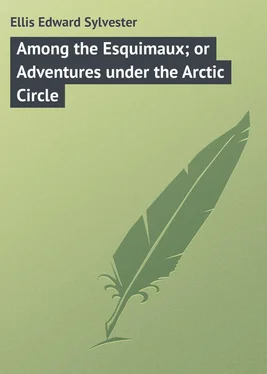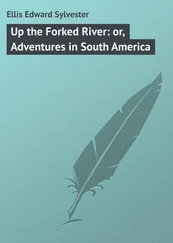Edward Ellis - Among the Esquimaux; or Adventures under the Arctic Circle
Здесь есть возможность читать онлайн «Edward Ellis - Among the Esquimaux; or Adventures under the Arctic Circle» — ознакомительный отрывок электронной книги совершенно бесплатно, а после прочтения отрывка купить полную версию. В некоторых случаях можно слушать аудио, скачать через торрент в формате fb2 и присутствует краткое содержание. Жанр: foreign_prose, foreign_language, на английском языке. Описание произведения, (предисловие) а так же отзывы посетителей доступны на портале библиотеки ЛибКат.
- Название:Among the Esquimaux; or Adventures under the Arctic Circle
- Автор:
- Жанр:
- Год:неизвестен
- ISBN:нет данных
- Рейтинг книги:3 / 5. Голосов: 1
-
Избранное:Добавить в избранное
- Отзывы:
-
Ваша оценка:
- 60
- 1
- 2
- 3
- 4
- 5
Among the Esquimaux; or Adventures under the Arctic Circle: краткое содержание, описание и аннотация
Предлагаем к чтению аннотацию, описание, краткое содержание или предисловие (зависит от того, что написал сам автор книги «Among the Esquimaux; or Adventures under the Arctic Circle»). Если вы не нашли необходимую информацию о книге — напишите в комментариях, мы постараемся отыскать её.
Among the Esquimaux; or Adventures under the Arctic Circle — читать онлайн ознакомительный отрывок
Ниже представлен текст книги, разбитый по страницам. Система сохранения места последней прочитанной страницы, позволяет с удобством читать онлайн бесплатно книгу «Among the Esquimaux; or Adventures under the Arctic Circle», без необходимости каждый раз заново искать на чём Вы остановились. Поставьте закладку, и сможете в любой момент перейти на страницу, на которой закончили чтение.
Интервал:
Закладка:
Rob turned in dismay to his parent, but he observed a twitching at the corners of his mouth, and a sparkle of the fine blue eyes, which showed he was only teasing him.
"Ah, father, I understand you!" exclaimed the big boy, springing forward, throwing an arm about his neck and kissing him. "You wouldn't think of separating us."
"I suppose not. There! get along with you, and tell your friend to make ready to sail next week, his business being to look after you while away from home."
And that is how Rob Carrol and Fred Warburton came to be fellow-passengers on the ship "Nautilus" on the voyage to the far North.
CHAPTER II
A COLOSSAL SOMERSAULT
The voyage of the "Nautilus" was uneventful until she was far to the northward in Baffin Bay. It was long after leaving St. John that our friends saw their first iceberg. They should have seen them before, as Captain McAlpine explained, for, as you well know, those mountains of ice often cross the path of the Atlantic steamers, and more than once have endangered our great ocean greyhounds. No doubt numbers of them were drifting southward, gradually dissolving as they neared the equator, but it so happened that the "Nautilus" steered clear of them until many degrees to the north.
The captain, who was scanning the icy ocean with his glass, apprised the boys that the longed-for curiosity was in sight at last. As he spoke, he pointed with his hand to the north-west, but though they followed the direction with their eyes, they were disappointed.
"I see nothing," said Rob, "that looks like an iceberg."
"And how is it with you, Mr. Warburton?" asked the skipper, lowering his instrument, and turning toward the younger of the boys, who had approached, and now stood at his side.
"We can make out a small white cloud in the horizon, that's all," said Fred.
"It's the cloud I'm referring to, boys; now take a squint at that same thing through the glass."
Fred leveled the instrument and had hardly taken a glance, when he cried:
"Oh! it's an iceberg sure enough! Isn't it beautiful?"
While he was studying it, the captain added: "Turn the glass a little to the left."
"There's another!" added the delighted youth.
"I guess we've struck a school of 'em," remarked Rob, who was using his eyes as best he could; "I thought we'd bring up the average before reaching Greenland."
"It's a sight worth seeing," commented Fred, handing the glass to his friend, whose pleasure was fully as great as his own.
The instrument was passed back and forth, and, in the course of a half-hour, the vast masses of ice could be plainly discerned with the unaided eye.
"That proves they are coming toward us, or we are going toward them," said Rob.
"Both," replied Captain McAlpine; "we shall pass within a mile of the larger one."
"Suppose we run into it?"
The old sea-dog smiled grimly, as he replied:
"I tried it once, when whaling with the 'Mary Jane.' I don't mean to say I did it on purpose, but there was no moon that night, and when the iceberg, half as big as a whole town, loomed up in the darkness, we hadn't time to get out of its path. Well, I guess I've said enough," he remarked, abruptly.
"Why, you've broken off in the most interesting part of the story," said the deeply interested Fred.
"Well, that was the last of the 'Mary Jane.' The mate, Jack Cosgrove, and myself were all that escaped out of a crew of eleven. We managed to climb upon a small shelf of ice, just above the water, where we would have perished with cold had not an Esquimau fisherman, named Docak, seen us. We were nearer the mainland than we dared hope, and he came out in his kayak and took us off. He helped us to make our way to Ivignut, where the cryolite mines are, and thence we got back to England by way of Denmark. No," added Captain McAlpine, "a prudent navigator won't try to butt an iceberg out of his path; it don't pay."
"It must be dangerous in these waters, especially at night."
"There is danger everywhere and at all times in this life," was the truthful remark of the commander; "and you know that the most constant watchfulness on the part of the great steamers cannot always avert disaster, but I have little fear of anything from icebergs."
You need to be told little about those mountains of ice which sometimes form a procession, vast, towering, and awful, that stream down from the far North and sail in all their sublime grandeur steadily southward until they "go out of commission" forever in the tepid waters of the tropic regions.
It is a strange spectacle to see one of them moving resistlessly against the current, which is sometimes dashed from the corrugated front, as is seen at the bow of a steamboat, but the reason is simple. Nearly seven-eighths of an iceberg is under water, extending so far down that most of the bulk is often within the embrace of the counter current below. This, of course, carries it against the weaker flow, and causes many people to wonder how it can be thus.
While the little group stood forward talking of icebergs, they were gradually drawing near the couple that had first caught their attention. By this time a third had risen to sight, more to the westward, but it was much smaller than the other two, though more unique and beautiful. It looked for all the world like a grand cathedral, whose tapering spire towered fully two hundred feet in air. It was easy to imagine that some gigantic structure had been submerged by a flood, while the steeple still reared its head above the surrounding waters as though defying them to do their worst.
The other two bergs were much more enormous and of irregular contour. The imaginative spectator could fancy all kinds of resemblances, but the "cold fact" remained that they were simply mountains of ice, with no more symmetry of outline than a mass of rock blasted from a quarry.
"I have read," said Fred, "that in the iceberg factories of the north, as they are called, they are sometimes two or three years in forming, before they break loose and sweep off into the ocean."
"That is true," added Captain McAlpine; "an iceberg is simply a chunk off a frozen river, and a pretty good-sized one, it must be admitted. Where the cold is so intense, a river becomes frozen from the surface to the ground. Snow falls, there may be a little rain during the moderate season, then snow comes again, and all the time the water beneath is freezing more and more solid. Gravity and the pressure of the inconceivable weight beyond keeps forcing the bulk of ice and snow nearer the ocean, until it projects into the clear sea. By and by it breaks loose, and off it goes."
"But why does it take so long?"
"It is like the glaciers of the Alps. Being solid as a rock while the pressure is gradual as well as resistless, it may move only a few feet in a month or a year; but all the same the end must come."
The captain had grown fond of the boys, and the fact that the father of one of them was a director of the company which employed him naturally led him to seek to please them so far as he could do so consistent with his duty. He caused the course of the "Nautilus" to be shifted, so that they approached within a third of a mile of the nearest iceberg, which then was due east.
Sail had been slackened and the progress of the mass was so slow as to be almost imperceptible. This gave full time for its appalling grandeur to grow upon the senses of the youths, who stood minute after minute admiring the overwhelming spectacle, speechless and awed as is one who first pauses at the base of Niagara.
Naturally the officers and crew of the "Nautilus" gave the sight some attention, but it could not impress them as it did those who looked upon it for the first time.
The second iceberg was more to the northward, and the ship was heading directly toward it. It was probably two-thirds the size of the first, and, instead of possessing its rugged regularity of outline, had a curious, one-sided look.
Читать дальшеИнтервал:
Закладка:
Похожие книги на «Among the Esquimaux; or Adventures under the Arctic Circle»
Представляем Вашему вниманию похожие книги на «Among the Esquimaux; or Adventures under the Arctic Circle» списком для выбора. Мы отобрали схожую по названию и смыслу литературу в надежде предоставить читателям больше вариантов отыскать новые, интересные, ещё непрочитанные произведения.
Обсуждение, отзывы о книге «Among the Esquimaux; or Adventures under the Arctic Circle» и просто собственные мнения читателей. Оставьте ваши комментарии, напишите, что Вы думаете о произведении, его смысле или главных героях. Укажите что конкретно понравилось, а что нет, и почему Вы так считаете.












![Edward Ellis - Adrift on the Pacific - A Boys [sic] Story of the Sea and its Perils](/books/753342/edward-ellis-adrift-on-the-pacific-a-boys-sic-s-thumb.webp)